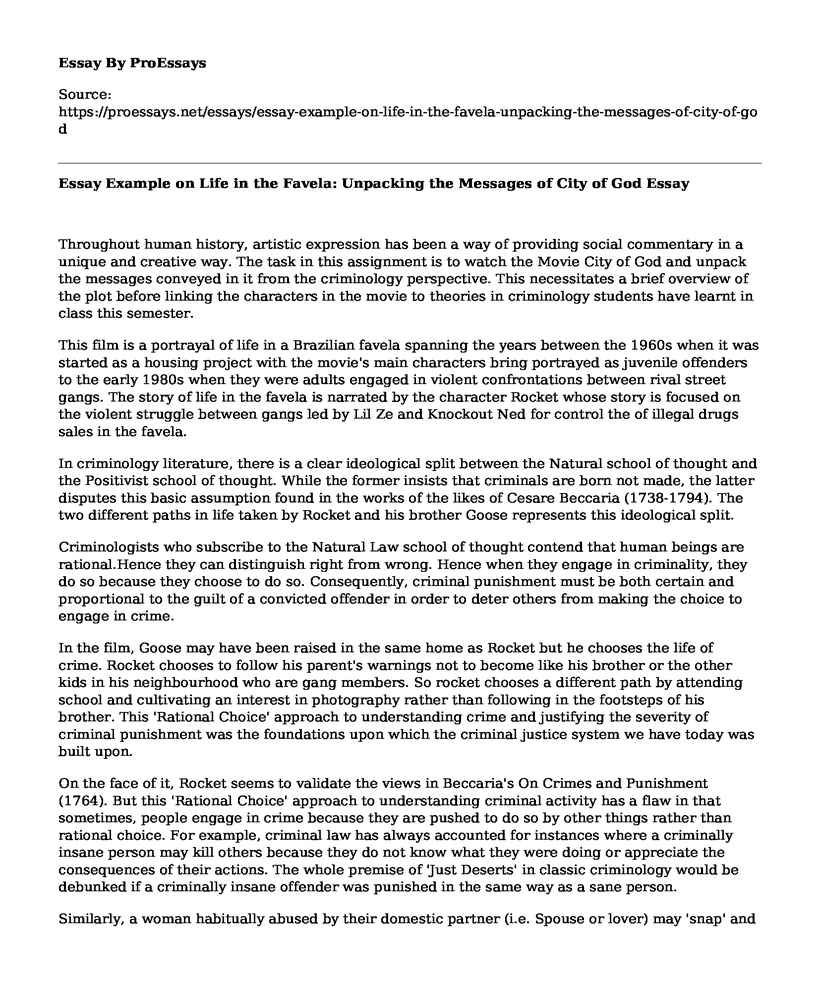Throughout human history, artistic expression has been a way of providing social commentary in a unique and creative way. The task in this assignment is to watch the Movie City of God and unpack the messages conveyed in it from the criminology perspective. This necessitates a brief overview of the plot before linking the characters in the movie to theories in criminology students have learnt in class this semester.
This film is a portrayal of life in a Brazilian favela spanning the years between the 1960s when it was started as a housing project with the movie's main characters bring portrayed as juvenile offenders to the early 1980s when they were adults engaged in violent confrontations between rival street gangs. The story of life in the favela is narrated by the character Rocket whose story is focused on the violent struggle between gangs led by Lil Ze and Knockout Ned for control the of illegal drugs sales in the favela.
In criminology literature, there is a clear ideological split between the Natural school of thought and the Positivist school of thought. While the former insists that criminals are born not made, the latter disputes this basic assumption found in the works of the likes of Cesare Beccaria (1738-1794). The two different paths in life taken by Rocket and his brother Goose represents this ideological split.
Criminologists who subscribe to the Natural Law school of thought contend that human beings are rational.Hence they can distinguish right from wrong. Hence when they engage in criminality, they do so because they choose to do so. Consequently, criminal punishment must be both certain and proportional to the guilt of a convicted offender in order to deter others from making the choice to engage in crime.
In the film, Goose may have been raised in the same home as Rocket but he chooses the life of crime. Rocket chooses to follow his parent's warnings not to become like his brother or the other kids in his neighbourhood who are gang members. So rocket chooses a different path by attending school and cultivating an interest in photography rather than following in the footsteps of his brother. This 'Rational Choice' approach to understanding crime and justifying the severity of criminal punishment was the foundations upon which the criminal justice system we have today was built upon.
On the face of it, Rocket seems to validate the views in Beccaria's On Crimes and Punishment (1764). But this 'Rational Choice' approach to understanding criminal activity has a flaw in that sometimes, people engage in crime because they are pushed to do so by other things rather than rational choice. For example, criminal law has always accounted for instances where a criminally insane person may kill others because they do not know what they were doing or appreciate the consequences of their actions. The whole premise of 'Just Deserts' in classic criminology would be debunked if a criminally insane offender was punished in the same way as a sane person.
Similarly, a woman habitually abused by their domestic partner (i.e. Spouse or lover) may 'snap' and kill or grievously harm their abuser. Furthermore, as it was explained by Kate Friedlander, in The Psychoanalytic Approach to Juvenile Delinquency (1947), children who are victims of sexual abuse often prey on their peers or grow up to manifest the childhood trauma by engaging in crime. This is especially true for boys. In all these scenarios, the actors never genuinely choose to commit a crime. They are pushed to do so.
The Positivist account for criminal conduct emerged to address this flaw in classical criminology. According to people who subscribe to this school of thought, external factors may prevent or push people into a life of crime.This is why I believe the director of The City of God seems to put a strong focus on life in the favela. It is possible to see how the director may be accused of glamorizing violent street gangs. I think anyone who takes this approach misses the film's main theme that children lives are wasted in low-income communities.
Life in the favela is central to the film's storyline. The quality of life is portrayed as progressively deteriorating into anarchy.In the beginning; life is good in the favela. When Rocket, transition into being a teenager, the favela is no longer bathed in sunlight. The film seems to be arguing that children rose in a community that is poorly policed with scarce economic opportunities along with broken homes and are likely to be pushed into a life of crime because they can't see any other way to meet their material needs. Consequently, a culture of crime becomes embedded in the social life of such a community. I think this is why even though Rocket is portrayed as wanting to follow a different path; he still succumbs to buying drugs.
Works Cited
Ribeiro, Andrea Barata, et al. City of God.2003.
Cite this page
Essay Example on Life in the Favela: Unpacking the Messages of City of God. (2023, Jan 16). Retrieved from https://proessays.net/essays/essay-example-on-life-in-the-favela-unpacking-the-messages-of-city-of-god
If you are the original author of this essay and no longer wish to have it published on the ProEssays website, please click below to request its removal:
- Concert Attendance Report Sample
- The Cons of Online Dating Essay Example
- Movie Analysis Essay on No Country for Old Men by Joel and Ethan Coen
- Pretty Hurts: Analyzing Beyonce Knowles' 2013 Music Video - Essay Sample
- Article Analysis Essay on Unfulfilled Dreams: Violinist at a New York Philharmonic Concert
- Kehinde Wiley: Upending Authority Through Art With Economy of Grace - Essay Sample
- The Sinister Soundscape: John Carpenter's Revolutionary Score in 'Halloween' (1978) - Paper Example







